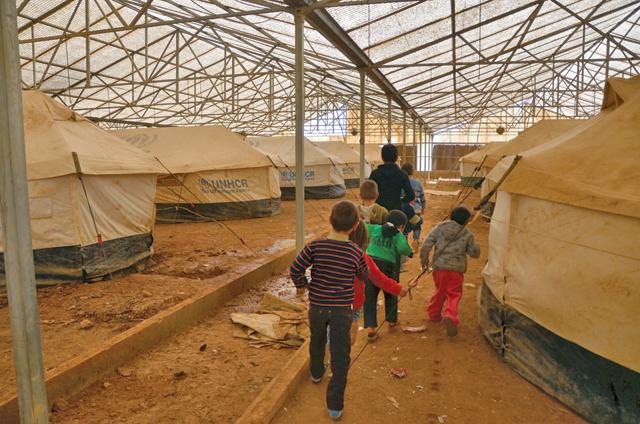AMMAN — For Wahid Yaseen, living in a tent in Amman is much better than staying in the Zaatari Refugee Camp in Mafraq or in his home in Syria.
The 50-year-old Syrian said living in the capital enables him to work and cover his expenses.
“Although it is good to receive aid from organisations, it is really important to depend on yourself and work to help your family financially,” he told The Jordan Times outside his tent.
Yaseen is one of many Syrian refugees who are staying in a makeshift camp in the capital and enjoying more freedom compared to the Zaatari camp, over 80km northeast of Amman, or in Syria.
The camp comprises 142 tents erected by the refugees themselves.
One of the camp’s residents who preferred anonymity said there are two camps in the Khreibet Al Souk neighbourhood, but the one where The Jordan Times interviewed refugees is the largest in the area.
The camp hosts refugees from Hama, Halab and Raqqa, according to Yousef Ali.
Abdul Munem Al Taqi, a Syrian refugee known as Abu Naim, said the majority of the camp’s residents are from Hama, which lies around 200km north of Damascus.
“A limited number of Syrian families had been living on this plot of land before the violence started in Syria,” he noted.
Ali, who was forced to leave the city of Hama, said the situation in Syria is difficult not only due to the violence, but also because the of the soaring prices of commodities.
“High prices and the difficulty of finding a job were the main reasons that drove me to leave Syria. For instance, the price of a kilogramme of rice is JD30 in Syria. Here [in the makeshift camp], it is better because I work and the situation is safe,” the father of nine noted.
Ali commended the positive spirit of the Jordanians who live near their camp, adding that they are always ready to lend a helping hand.
Yaseen noted that most refugees work at a fruit and vegetable market near the camp, and are paid JD0.9 per hour.
“The owner of the land where we have set up camp owns the market, and he allows us to stay here as long as we work at the market. The good thing is that we are being paid as well, so we can help our families financially,” he added.
Many other Syrian refugees complain about the lack of assistance or job opportunities, Yaseen charged.
“There is no need to complain. Some people are used to complaining even though they are rich. If you need a job, you can go out and search for it,” he added.
Although Amman received heavy rain and snow recently, the tents in the camp were not flooded, according to Yaseen.
“Many people worked hard to protect their tents from the rain. Only the tents of those too lazy to do something to protect themselves and their families were flooded,” he added.
Abu Naim, whose seventh child was born in the camp a month ago, said his family feels more comfortable there than in Zaatari, where there is less privacy.
“Women do not feel at ease in the Zaatari camp because everyone can see them, and since most of them wear hijab, they don’t have a place where they feel comfortable enough to take it off as if they were in the privacy of their own home,” he noted.
“The tents in Zaatari are too close to each other, so they don’t have any privacy even in their own tent,” said Abu Naim, who has been living in the Amman camp for two months with his family.
Abu Mohammad, who is from Hama, said he does not trust his compatriots in the Zaatari camp, which is home to over 100,000 refugees.
“If parents want to take their child to hospital for example, they might come back and find everything in their tent stolen,” he claimed.
“Here, we are all from the same area and we know each other. No one is a stranger.”















